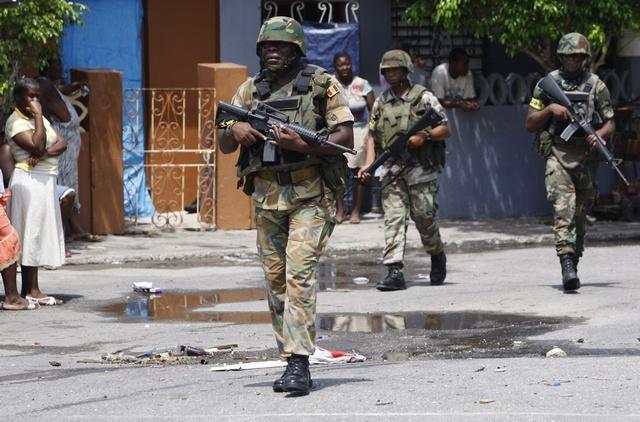Brittany Stevens
Journalist, Mattathias Schwartz, was on vacation in Jamaica with nothing to do when a story that would tell another side of a deadly event fell into his lap. Schwartz caught wind of the story about a raid in a West Kingston, Jamaica community called Tivoli Gardens.
A source revealed to Schwartz that the account of the raid in the news was false. The source told Schwartz many innocent lives were taken in the midst of the raid, despite what was being reported. It wasn’t long before Schwartz jumped into the story, giving a voice to the Tivoli community.

Soldiers patrol a street in the Tivoli Gardens neighborhood of Kingston on May 27, 2010.
© 2010 Reuters
Tivoli was originally a reconstructed neighborhood set up by government officials in the 1960s’. A corrupt government eventually caused the neighborhood to become one of Jamaica’s first Garrison communities,neighborhoods controlled by drug gangs. Tivoli eventually fell under the leadership of Don Lester Lloyd Coke, one of the most powerful drug kingpins in Jamaican history.
Throughout the ‘90s, Jamaican street gangs were notorious for drug sells throughout Jamaica, and Lloyd-Coke led this drug industry with the help of the Jamaican government until his death. The youngest son of the notorious don, Christopher Coke, eventually took over, leading in his father footsteps. Coke created his own penal process that included jail, magistrates, laws, and executioners.
Residents looked to their community leader for tuition, legal aid, loans, and medicine, among other things. Coke was such a powerful leader that under his control a large percentage of the Tivoli community had electricity, while other parts of Jamaica were not afforded the luxury or struggled to afford it.
The “Tivoli Massacre”, as Schwartz refers to the raid in his article title, was a result of the Drug Enforcement Administration’s plan to extradite and arrest Coke for his connection to a drug ring in America. Protected by the community and relationships with Jamaican government officials, Coke resided in Tivoli untouchable to law enforcement until the massacre.
When word spread that he would soon be arrested, thousands of Tivoli women marched in downtown Kingston on Coke’s behalf. Schwartz’s reports say the women wore white and carried signs written in marker on scraps of cardboard.
Signs marked with phrases like “Taking Di Boss Is Like Taking Jesus”; “After God, Dudus Comes Next!”; “Jesus Die for Us. We Will Die for Dudus!”
Schwartz reports that even while Coke prepared Tivoli for war with officials, he was negotiating a surrender in fear of dying like his father. The planned truce quickly turned sour when Coke’s henchmen attacked Jamaican law enforcement. The police commissioner cut off negotiations and declared a state of emergency in Kingston, giving security forces power to search, arrest, and hold residents in detention.
On May 23, 2010, the Jamaican military, with the assistance of U.S. intelligence, entered the community and over a course nearly five days searched for Coke. This attempt to extradite Coke resulted in the deaths of over 70 community residents.
News outlets initially reported the attempt to extradite Coke resulted in a war between the Jamaican military and drug gangs. American news outlets were among those stating that the security forces encountered an armed, organized opposition by Coke supporters. The surviving residents of the massacre seemed to refute those claims, stating when officials were unable to locate Coke, they executed several innocent people. In several instances, witnesses reported seeing soldiers shoot unarmed men at point-blank range.
According to the United Nations Basic Principles on the Use of Force and Firearms by Law Enforcement Officials, law enforcement officials should apply non-violent means before resorting to the use of force and firearms. Whenever the lawful use of force and firearms is unavoidable, law enforcement officials should use restraint and act in proportion to the seriousness of the offense. According to the United Nations Human Rights website, the law states that basic principles call for an effective reporting and review process, especially in cases of death and serious injury.
The way residents describe the tragic events on that day in Tivoli represents a clear misuse of force under this law. The issue with the accounts of the residents is their word is waged against the account of Jamaican military officials. But, Schwartz reports revealed the U.S., who played a quiet hand in the attack, has video footage that could support the claims of either side.
Flying above the deadly events was The Department of Homeland Security’s P-3 Orion, filming with its on board cameras. A Jamaican photographer snapped photos of it during the massacre. Schwartz, after spending time in Tivoli investigating, filed a Freedom of Information Act request with DHS and confirmed its presence.
“All scenes were continuously recorded,” a DHS document Schwartz acquired confirmed.
DHS refuses to release the video, accord to Schwartz.
A makeshift burial is located at the end of a road in Jamaica where the bodies of residents slain in the Massacre lay to rest. The U.S. and Jamaican military forces have never taken responsibilities for innocent lives taken in the drug military operation.




